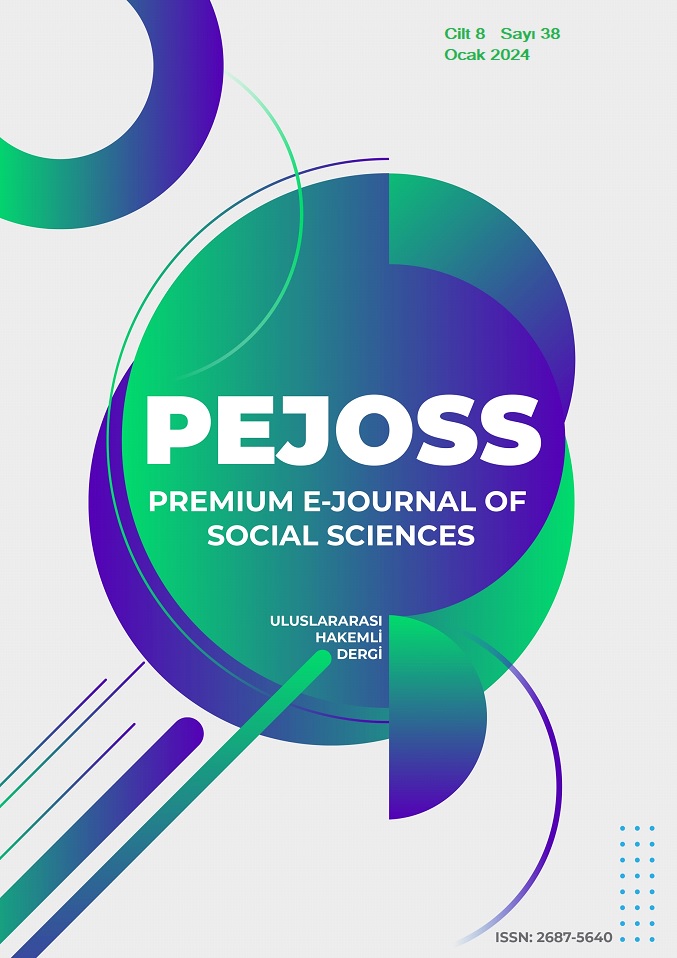Examining Teachers' Decision-making Styles, Social Skill Levels and Ways of Coping with Stress
DOI:
https://doi.org/10.5281/zenodo.10616905Keywords:
Stress, Decision making, Style, Social skillsAbstract
Stress, one of the frequently used concepts in daily life and scientific literature, is a negative situation that largely strains the individual's capacity. Tolerance of stress levels, which is an inevitable element of our lives, varies individually. Individuals' constant expectations and efforts to find new pursuits leave them in a difficult situation when it comes to using the strategies they follow in decision-making. Decision making is the process of choosing one of multiple paths that are intended to lead an individual to the goal he or she wants to achieve. Complex situations make decision making very difficult. Cognitive processes must be processed for the individual to make healthy decisions. In the light of this information, the aim of this study was to examine teachers' decision-making styles, social skill levels and ways of coping with stress. The population of this study in the survey model consists of 250 teachers working in public schools affiliated with the Ministry of National Education in the 2022-2023 academic year. The data collected with the survey titled "teachers' decision-making styles and social skill levels and ways of coping with stress", consisting of 4 classification questions and 7 questions with 4 grades; It was analyzed by converting it into graphs containing frequency and percentage using Microsoft Office Excel software. As a result of this study, it was concluded that the best thing that people can do is to make the best decision in line with the conditions and information, and to make new decisions for situations that may cause problems.
Downloads
References
Arslan, M. (2007). “Eğitimde Yapılandırmacı Yaklaşımlar”, Ankara Üniversitesi Eğitim Bilimler Fakültesi Dergisi, 40(1),45-55.
Artan, İ. (1987). Örgütsel Stres Kaynakları. Marmara Üniversitesi İ.İ.B.F. Dergisi, 4(2),65-72.
Çuhadaroğlu, F. (1989). Üniversite Gençliğinde Kimlik Bocalamaları. Üniversite Genliğinde Uyum Sorunları Sempozyumu Bilimsel Çalışmaları. Bilkent Üniversitesi Psikolojik Danışma ve Araştırma Merkezi.
Dağ, İ. (1990). Kontrol Odağı, Stresle Başaçıkma Stratejileri ve Psikolojik Belirti Gösterme İlişkileri. (Yayınlanmamış Doktora Tezi). Sosyal Bilimler Enstitüsü, Hacettepe Üniversitesi.
Deniz, M. (2004). Investıgatıon Of The Relatıon Between Decısıon Makıng Self-Esteem, Decısıon Makıng Style And Problem Solvıng Skılls Of Unıversıty Students. Eurasian Journal of Educational Research (EJER), 15(23), 1302-1315.
Ersever, Ö.H. (1996). Karar verme becerileri kazandırma programının ve etkileşim grubu deneyiminin üniversite öğrencilerinin karar verme becerileri üzerindeki etkileri.[Doktora Tezi] (51580). Sosyal Bilimler Enstitüsü, Ankara Üniversitesi.
Ertekin, Y. (1993). Stres ve Yönetim, Akara: Gazi yayınevi.
Folkman, S. & Lazarus, R.S. (1980). An Analysis of coping in a Middle- Aged Community Sample. Journal of Healty and Social Behavior.7 (21), 219-239.
Herbes, S. E., & Allen, C. P. (1983). Lipid quantification of freshwater invertebrates: method modification for microquantitation. Canadian Journal of Fisheries and Aquatic Sciences, 40(8), 1315-1317.
İnayet, P. (2002). İş Yaşamında Stres, Ankara: Pegem Yayınları.
Kırıcı, B. (2010). Örgütsel Stres Yönetimi ve Bir Uygulama. [Yüksek Lisan Tezi].Sosyal Bilimler Enstitüsü, İnönü Üniversitesi.
Özbay, Y., & Palancı, M. (2000). Stresle başa çıkma davranışlarının algılanan kontrol düzeyi ve cinsiyet açısından değişkenliği. XI. Ulusal Psikoloji Kongresi, Ege Üniversitesi, 19-22.
Palancı, M. (2004). Üniversite Öğrencilerinin Sosyal Kaygı Problemlerini Açıklama ve Gidermeye Yönelik Gerçeklik Terapisi Oryantasyonlu Bir Yardım Modelinin Geliştirilmesi. (Yayınlanmamış Doktora Tezi). Sosyal Bilimler Enstitüsü, Karadeniz Teknik Üniversitesi.
Pehlivan, İ. (2000). İş Yaşamında Stres. Ankara: Pegem Yayıncılık.
Tiryaki, M.G. (1997). Üniversite Öğrencilerinin Karar Verme Davranışlarının Bazı Değişkenler Açısından İncelenmesi. (Yayınlanmamış Yüksek Lisans Tezi). Sosyal Bilimler Enstitüsü, Hacettepe Üniversitesi.
Totan, T., Danacı, F. N., & Bedir, İ. (2023). Duygu düzenleme stratejilerinin karar verme stilleri üzerindeki etkilerinin incelenmesi. Uluslararası Karamanoğlu Mehmetbey Eğitim Araştırmaları Dergisi, 5(2), 86-93.
Tolan, Ö. Ç., & Kara, B. C. (2023). Sosyal Kaygı ile Genel Öz Yeterlik Arasındaki İlişkide Bilişsel Esnekliğin Aracı Rolü/The Mediating Role of Cognitive Flexibility in the Relationship between Social Anxiety and General Self-Efficacy. e-Uluslararası Eğitim Araştırmaları Dergisi, 14(1), 229-244.
Downloads
Published
How to Cite
Issue
Section
License
Copyright (c) 2024 Premium e-Journal of Social Science (PEJOSS)

This work is licensed under a Creative Commons Attribution 4.0 International License.


